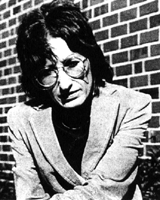
Kay Closson
is honored with a Brick from Anita Skeen.
 When Kay Closson turned up in my Continuing Education Poetry Workshop in 1972, my first year as an instructor at Wichita State, I was amazed by the quality of her work. I was fresh out of graduate school with a brand new MFA in Creative Writing, and here was a student who was older, more experienced, and a better writer already than I was. How could I teach her anything?
When Kay Closson turned up in my Continuing Education Poetry Workshop in 1972, my first year as an instructor at Wichita State, I was amazed by the quality of her work. I was fresh out of graduate school with a brand new MFA in Creative Writing, and here was a student who was older, more experienced, and a better writer already than I was. How could I teach her anything?
In the years that followed, we became collaborators and friends, working together on a collection of 25 poems that retold the story of what really happened in the Garden of Eden, "The Book of Lilith." We were interviewed by "Ms" magazine about our collaborative process, had that book and a number of other collaborative poems published in literary journals and anthologies, and did workshops throughout the Midwest about working with collaborative writing.
Kay was a fine poet, an articulate spokesperson for her craft, and a patient and engaging teacher. I believe she loved poetry more than anything in the world, and her dedication to the craft kept her going through many hard times. Kay's life had not been an easy one. As a victim of polio when she was an early adolescent, she was forced to give up a promising career as a concert pianist and turn to other forms of art. She sang, she played the guitar, she drew, she wrote poetry. She struggled with debilitating illness and pain from the time I knew her, and died in 1989 after suffering the catastrophic effects of an aneurysm two years earlier which left her in a wheelchair and barely able to communicate. If Life ever treated anyone unfairly, surely it was Kay Closson.
Despite illness, financial difficulties, family difficulties, and rejection slips, Kay kept on writing. She was one of the few people I know who wrote every day, every day, no matter what. I believe it was her writing that kept her alive, kept her sane, kept her connected to the world, and when she was no longer able to do that, she was not able to keep going. She talked to others, to students and young writers in the public schools where she often worked as a poet-in-residence, about the power of words, about meaning and metaphor, about the necessity of telling one's own story.
It was primarily Kay's doing that she and I began, in 1981 for Women's Studies at Wichita State University, the Women's Writing Series, a forum each spring for both established and new writers to present their work to a university and community audience and to let the voices of women writers be heard. After her death, the series, which moved to the fall semester, became the Kay Closson Annual Women's Writing Series and continues today. This is one of Kay's legacies to the literary world.
She left behind only one book of poems, published posthumously, and numerous poems scattered in literary magazines across the country. But she also left behind, for those of us who knew her, a spirit of endurance, of perseverance, of triumph in the face of tragedy and a certainty that the pen is mightier than the sword.
I would like her to be remembered this way:
"Bushwhacked"
for Kay Closson
You never expected it
to come in sleep, loving
the chaos of the struggle
as it did, the tireless tugs-of-war
until you both turned blue.
Always before, it came at you
face to face, found you
suction-cupped to life,
incorrigible, alive and kicking,
the quick-draw artist of the East Side.
This time you got shot from behind.
You didn't have a prayer.
It knew you'd never leave
willingly, just for the ride.
Too many guerrillas vanish
that way. And some of them
your friends.
So, knowing it had been losing
the shoot-out for years, Death
sold out in a weak moment.
We all have those tragic flaws,
it's no surprise (How many
silver dollars, do you think?)
Off it rode, on a hot August night,
sweating like the devil,
slipped in the back door while the t.v.
and your husband's eyes flickered
in the next room, came up
behind you in the smothering heat
of the bedroom, and left
with your last breath.
Didn't give you a chance
to go for the throat,
or another tender spot.
Didn't say beans about taking you
out. Coward. It knew that
if it so much as opened its mouth,
you'd ride out of town
with the last word.
Submitted by Anita Skeen
July 28, 1998










